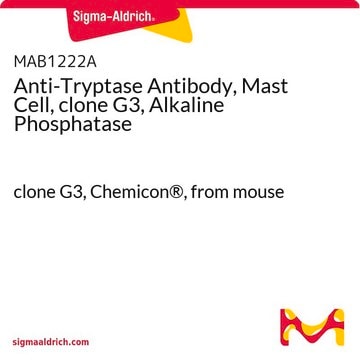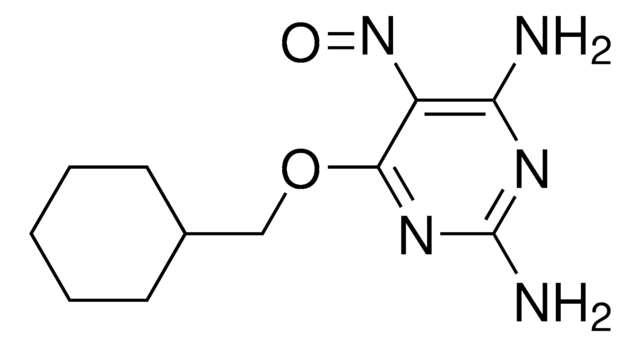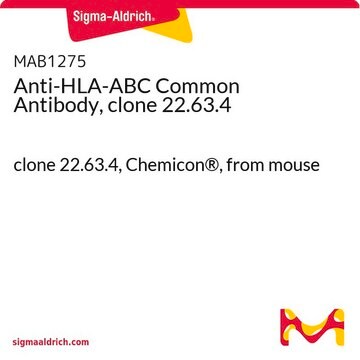MAB1222
Anti-Tryptase Antibody, Mast Cell, clone G3
clone G3, Chemicon®, from mouse
Synonyma:
Mast cell tryptase antibody
Přihlásitk zobrazení cen stanovených pro organizaci a smluvních cen
About This Item
UNSPSC Code:
12352203
eCl@ss:
32160702
NACRES:
NA.41
Doporučené produkty
biological source
mouse
Quality Level
antibody form
purified immunoglobulin
clone
G3, monoclonal
species reactivity
human
manufacturer/tradename
Chemicon®
technique(s)
flow cytometry: suitable
immunohistochemistry: suitable
western blot: suitable
isotype
IgG1κ
NCBI accession no.
UniProt accession no.
shipped in
wet ice
target post-translational modification
unmodified
General description
Tryptase is the most abundant secretory granule-derived serine proteinase contained in mast cells. Tryptase has recently been used as a marker for mast cell activation and is involved with allergic response. Tryptase may act as a mitogen for fibroblast lines. Elevated levels of serum tryptase occur in both anaphylactic and anaphylactoid reactions, but a negative test does not exclude anaphylaxis.
Specificity
Recognizes Mast cell tryptase. Will show reactivity to basophils but to a lesser degree.
Application
Flow Cytometry Analysis: A previous lot of this antibody has been used on fixed cells in FACS using a conjugated secondary antibody. (Sperr, W., et al., 2001).
Optimal working dilutions must be determined by end user.
Optimal working dilutions must be determined by end user.
Research Category
Inflammation & Immunology
Inflammation & Immunology
Research Sub Category
Inflammation & Autoimmune Mechanisms
Inflammation & Autoimmune Mechanisms
This Anti-Tryptase Antibody, Mast Cell, clone G3 is validated for use in FC, IH, WB for the detection of Tryptase.
Quality
Evaluated by western blot on human fetal skin lysate.
Western Blot Analysis: 0.5 µg/mL of this antibody detected tryptase in 10 µg of human fetal skin lysate.
Western Blot Analysis: 0.5 µg/mL of this antibody detected tryptase in 10 µg of human fetal skin lysate.
Target description
31 kDa
Physical form
Format: Purified
Protein G Purified
Purified mouse monoclonal IgG1κ in buffer containing 0.1 M Tris-Glycine (pH 7.4, 150 mM NaCl) with 0.05% sodium azide.
(see product datasheet for specific buffer formulation)
(see product datasheet for specific buffer formulation)
Storage and Stability
Maintain at 2–8°C for the duration listed on the product datasheet. (See product datasheet for storage conditions)
Analysis Note
Control
Mast cells, basophils
Human fetal skin lysate
Mast cells, basophils
Human fetal skin lysate
Other Notes
Concentration: Please refer to the Certificate of Analysis for the lot-specific concentration.
Legal Information
CHEMICON is a registered trademark of Merck KGaA, Darmstadt, Germany
Disclaimer
Unless otherwise stated in our catalog or other company documentation accompanying the product(s), our products are intended for research use only and are not to be used for any other purpose, which includes but is not limited to, unauthorized commercial uses, in vitro diagnostic uses, ex vivo or in vivo therapeutic uses or any type of consumption or application to humans or animals.
Storage Class
12 - Non Combustible Liquids
wgk_germany
WGK 1
flash_point_f
Not applicable
flash_point_c
Not applicable
Osvědčení o analýze (COA)
Vyhledejte osvědčení Osvědčení o analýze (COA) zadáním čísla šarže/dávky těchto produktů. Čísla šarže a dávky lze nalézt na štítku produktu za slovy „Lot“ nebo „Batch“.
Již tento produkt vlastníte?
Dokumenty související s produkty, které jste v minulosti zakoupili, byly za účelem usnadnění shromážděny ve vaší Knihovně dokumentů.
Serum inhibitors for human mast cell growth: possible role of retinol.
S Ishida, T Kinoshita, N Sugawara, T Yamashita, K Koike
Allergy null
E Karamitopoulou et al.
International journal of immunopathology and pharmacology, 27(2), 213-220 (2014-07-10)
Increasing evidence indicates that tumor microenvironment (TME) is crucial in tumor survival and metastases. Inflammatory cells accumulate around tumors and strangely appear to be permissive to their growth. One key stroma cell is the mast cell (MC), which can secrete
Christian Breuer et al.
World journal of gastroenterology, 16(34), 4363-4366 (2010-09-08)
Constipation and fecal impaction are frequent and distressing complaints in pediatric gastroenterology. Especially in neurologically handicapped children, treatment of severe forms of slow-transit constipation (STC) can be difficult. In the majority of cases, STC is of unknown etiology. However, in
Identification of a cathepsin G-like proteinase in the MCTC type of human mast cell
Schechter, N. et al.
Journal of immunology (Baltimore, Md. : 1950), 145, 2652-2661 (1990)
Aida Paivandy et al.
Frontiers in immunology, 8, 1645-1645 (2017-12-13)
Mast cells are implicated as detrimental players in inflammatory lung diseases, particularly asthma. Mast cells respond to activating stimuli by releasing a wide panel of pro-inflammatory compounds that can contribute profoundly to the pathology, and there is currently an unmet
Náš tým vědeckých pracovníků má zkušenosti ve všech oblastech výzkumu, včetně přírodních věd, materiálových věd, chemické syntézy, chromatografie, analytiky a mnoha dalších..
Obraťte se na technický servis.








